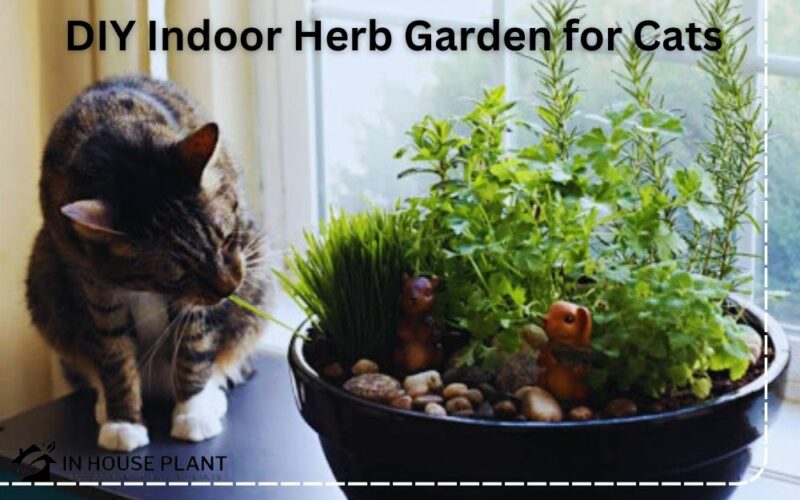Here, I will tell you about my experiences in creating a DIV indoor herb garden for cats and will give you a list of cat-safe herbs with their benefits.
A while ago, my cousin created a DIY indoor herb garden for her cats and I helped her. She loves cats and cannot stand them begging to go outside to play so decided to bring a simple version of an herb garden inside. While building it, I learned a lot of points and set out to share my experiences and knowledge with you that try to increase the well-being of your lovely furry felines.
After that, I found a lot of physical and mental well-being benefits in herb gardens for her cats. I found out that while the cats nibble on the herbs’ leaves or roll around in the indoor herb garden, they experience a combination of sensory stimulation, digestion support, relaxation and calming effects, and overall health support.
But before starting to build an indoor herb garden for your playful fluffy friends you must ensure to choose nontoxic plants for cats. Keep reading.
You can also hear the audio version of this article.
Recommended Herbs Safe for Cats

Every herb isn’t safe for our cats. I provided a list of cat-safe herbs in the following based on the ASPCA. I also searched about their benefits for our lovely fluffy friends and found wonderful information that can help you choose the best ones for your indoor herb garden for cats.
Rosemary: Rosmarinus officinalis
Benefits:
- Antioxidants and antibacterial properties
Cautions:
- It is a safe-cat herb only when used in moderation.
- Its essential oils are toxic to cats.
Thyme: Thymus vulgaris
Benefits:
- antimicrobial properties
- support respiratory health
- boost the immune system
Cat Grass
Cat grass is a common name that can refer to one of the following species:
- Wheatgrass: Triticum aestivum
- Barleygrass: Hordeum vulgare
- Oatgrass: Avena sativa
Benefits:
- aid in digestion
- prevent hairballs
- high in fiber for cats
- contains minerals like iron, manganese, zinc, and vitamin B
Valerian: Valeriana officinalis
You will find the Valerian Root completely safe for cats to smell and ingest.
Benefits:
- calming effect on cats (the roots)
- reduce anxiety and stress in cats.
- promote relaxation and better sleep
Dill: Anethum graveolens
Benefits:
- provides a pleasant aroma
- It can add flavor to cats’ food
Basil: Ocimum basilicum

Benefits:
- a pleasant scent
- adding flavor to cat’s food.
Cautions:
- Basil in your indoor herb garden is safe for cats if used in moderation.
Lemon Balm: Melissa officinalis
Benefits:
- a calming effect on cats
- reducing stress and anxiety.
Sage: Salvia officinalis
Benefits:
- antimicrobial properties
- a natural insect repellent.
Cautions:
- Sage, in moderation, can be a safe herb for cats in your indoor herb garden.
Cilantro (Coriander): Coriandrum sativum
Benefits:
- Its leaves are considered safe for cats
- You can use it to add a refreshing taste to the cat’s diet.
Fennel: Foeniculum vulgare
Benefits:
- Aid cat’s digestion
- Help alleviate gas and bloating
Cautions: keep in mind Fennel is safe for cats only when used in moderation,
Catmint (Catnip): Nepeta cataria
Benefits:
- A euphoric effect on cats.
- increase activity, encourage exercise and play in cats, and stimulate them to behaviors like rolling and purring
Cautions:
- ASPCA has put this plant on the list of the toxic-plants for cats but I couldn’t find any evidence that it is toxic.
- In addition, most references say Catnip is completely non-toxic in small amounts and will induce playful behaviors in your cats.
Parsley: Petroselinum crispum
Benefits:
- aid in cats’ digestion
- Support overall health of cats: contain vitamins and minerals
Cautions:
- ASPCA listed parsley as a toxic plant for cats but I read that it’s OK when used in small amounts
My Indoor Herb Garden for Cats

Above, I told you about the herbs safe for cats, now come on to build our indoor herb garden for our furry friends. The first step is choosing some cat-safe herbs for planting. The important tip is to select herbs with similar caring requirements.
For example, you cannot plant Basil and Thyme in the same pot due to their different watering requirements. Hence, I set out to create the following table. You can find the primary requirements of herbs safe for cats and choose the best ones for your DIY indoor herb garden.
| Light requirements | watering | Best soil | |
| Rosemary: Rosmarinus officinalis | Full sun (Cannot tolerate shade) | Fairly drought tolerant (watering new plants regularly). |
|
| Thyme: Thymus vulgaris | Full sunlight | Drought tolerant (rarely need watering) |
|
| Cat Grass | Sunlight | Consistently moist conditions but not wet | Lightweight potting mix |
| Valerian: Valeriana officinalis | Prefers partial shade | Consistently moist conditions but not wet | A fertile loam soil |
| Dill: Anethum graveolens | Direct sunlight daily | Consistently moist conditions but not wet |
|
| Basil (in moderation): Ocimum basilicum | Sunny location with bright light per day | Consistently moist conditions but not wet |
|
| Lemon Balm: Melissa officinalis | Full sunlight (can tolerate light shade). | Consistently moist conditions but not wet |
|
| Sage (in moderation): Salvia officinalis | Direct sunlight | Water new plants once or twice per week.
water the plants with a good root system every week or two. |
Well-drained soil |
| Cilantro (Coriander): Coriandrum sativum | Full sun (can tolerate light shade) | Consistently moist conditions but not wet |
|
| Fennel (in moderation): Foeniculum vulgare | Direct sunlight | Drought tolerant |
|
| Catmint (Catnip): Nepeta cataria | Full sun to partial shade | Drought tolerant (watering new plants regularly). |
|
| Parsley: Petroselinum crispum | Direct sunlight | Water when the soil dries out. |
|
After you choose the herbs, it’s turning to start building your garden. provide the following things:
- A pot
- Gardening shovel.
- Potting soil mix
- The seeds or seedlings of cat-safe herbs
- Water bottle spray
I prefer the long or bowl-shaped planters. Because cats easily tip over the tall pots. If you are a new gardener, I recommend using pots with drainage holes. However, planting in cachepots has its advantages if you know how to plant in a pot without holes and how to water it to prevent root rot.
Fill one-third of your planter with the soil mix and then put the seedlings inside it (start from center to out). then add soil till fill the planter. now, water your indoor herb garden fairly. You can also plant seeds of herbs safe for cats. I spread them on topsoil and cover the surface with a fine soil layer.
And now, my indoor herb garden for cats is ready. I often put it in a bright place with indirect sunlight for several days.
Because while you plant the seedlings, their root system will be damaged and the plant will be shocked. If you put it in exposed sunlight, the roots cannot absorb enough water and your indoor herb garden will suffer from under-watering stress.
Another point is that if your home doesn’t have sufficient light, you can get help from growing lights. I discussed it in my other post about the best under-cabinet grow light for herbs.
My Recommendation for an indoor herb garden for cats

However, I listed the above cat-safe herbs based on the ASPCA, but found out every cat is unique, and the response of my cats to herbs may vary. Hence, I think moderation is key to your success in an indoor herb garden for cats. So, I recommend:
- Introduce new herbs gradually to your cat in your indoor herb garden. Monitor your cat’s response. Always start with small amounts of herbs.
- I always observe my cat’s behavior, and when I have any concerns, consult with a veterinarian. They provide me with guidance based on my cat’s specific needs.
Conclusion
Now you have a guideline to create your DIY indoor herb garden for cats with a list of cat-safe herbs with their benefits. I chose Catnip, Thyme, and Rosemary for my indoor herb garden. I found them low-maintenance plants with low watering needs. What do you think? which cat-safe herbs are on your list for your indoor herb garden? Please write their names below this page and share your experiences and ideas with my readers.

Elahe Rabiei
Hi, I’m Elaheh. My Academic major is plant protection, and houseplants are my expertise. As a houseplant lover, my house is full of indoor plants and it is my passion to take care of them. Hence, I’m here to share my knowledge and experience about growing healthy houseplants. I am also a plant protection advisor, so feel free to ask me any questions you may have.

